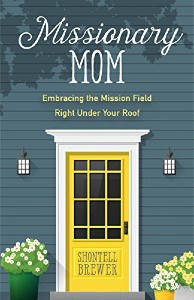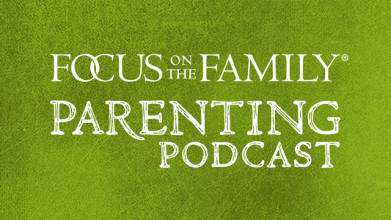Teaser:
Shontell Brewer: … I went home and I was like, “You know what? Instead of telling you, Lord who I want to be, I’m going to ask what are my priorities.” And He gave them to me very succinctly. It’s my relationship with Him, it’s my relationship with my husband, and then my kids and everything else.
End of Teaser
John Fuller: Well, if you’re mom struggling with purpose, if you want to do something really big for God, but you don’t have the energy or the time, you just can’t quite get there. Um, maybe you’re already doing it. How’s that sound? Uh, your children are the most important mission field you could ever work in. And that’s our subject today on Focus on the Family, with your host Focus president and author Jim Daly. Our guest today is Shontell Brewer. And I’m John Fuller.
Jim Daly: John, you set it up well. Uh, moms are some of the most influential people, I wouldn’t say some of, they are the most influential people on the planet. And we can’t emphasize enough their importance to the family and in shaping a- a child’s heart for the Kingdom of God. And I’m looking forward to this conversation with a mom of five children, ranging in ages from 14 to 22. She’s written, uh, a book called Missionary Mom: Embracing the Mission Field Right Under Your Roof, not your nose-
Shontell: (laughs)
Jim: … but probably both would apply.
John: Well, Shontell Brewer is an educator, a youth pastor, a blogger and works full-time as a prevention coordinator to help middle school and high school girls who have been trafficked, and are working to make a new start.
Jim: Shontell, welcome to Focus.
Shontell: Thank you so much. This is just absolutely a dream come true to be here with you guys.
Jim: Well, that’s very kind. Um, boy, listening to what you’re doing, you sound really busy. And on top of raising the kids, I mean, the work you do with the ladies, the girls, what is that? Describe it for us.
Shontell: So we actually, when our school shut down last year, we’ve been doing this for a while, but when our school shut down last year, we knew that already teenagers have a hard time if they’ve been trafficked in their life, um, going into a regular everyday school setting. Their problems are a little different, they function in a trauma brain. Their teachers don’t really know how to take them. Other students don’t know how to take them.
Jim: Right.
Shontell: They don’t even know how to take themselves yet. So, in a everyday situation, that can get a little bit crazy. And the last thing they care about is a spelling test. (laughs)
Jim: Right.
Shontell: So, what we did is based on that understanding of trauma brain, we opened up a classroom, it’s actually two rooms. We currently have six, sometimes seven students, we have one who’s kind of one foot in one foot out, she’s not sure yet, she’s our middle schooler.
Jim: Yeah.
Shontell: But for the girls who are bought in and really want to go to school, they just know that they’re not handling it in a regular public school. What we do is we provide a space for them. And I’m the educator in the classroom. They’re in an online program right now, and so I just support them.
Jim: Yeah. It’s just so awesome.
Shontell: Thank you.
Jim: Because you’re also being mom at home-
Shontell: Yeah.
Jim: … and you’re an associate pastor and a youth pastor. And, you know, you- you’re just- you have a lot of things going on.
Shontell: Thank you.
Jim: And I guess that’s maybe the place to start. How do you concentrate on your own children when you’re taking care of some very broken people?
Shontell: Yeah. Um, I have really good boundaries. I’m very good at delegating things. I also follow Jesus’s lead and take naps. I’m a big fan of it. Um, and when I’m- wherever I’m at, I’m all in in that space. So I’m a fan of airplane mode on my phone as well.
John: (laughs)
Jim: Can I- let me ask you something. I see this in my own wife, Jean. But, um, sometimes I think women particularly, can feel a lot of guilt, that they’re not doing enough, um, that they don’t have time to relax. If you have time to relax, that’s guilt.
Shontell: Yeah.
Jim: And you could be filling that time to do something for the Kingdom.
Shontell: Yeah.
Jim: You sound like a little bit like that kind of person, that you’re, y- you keep a lot of things going. Uh, speak to mom guilt and how not to have mom guilt.
Shontell: Yeah. I- I think it’s, I- when we recognize mom guilt for what it actually is and who it’s actually from, it’s a little bit easier to shove it off or just not receive it. I definitely still I’m not perfect at it, but, uh, you know, C.S. Lewis does a fantastic job in Screwtape Letters-
Jim: (laughs)
Shontell: … of handing out that idea of, uh, you know, who’s really whispering to us and what it means, and I think mom guilt falls under that category.
Jim: Mm.
Shontell: It’s definitely a whisper from not the Lord. It is not God’s plan for us to feel guilty. And in my book, I even say, embrace where God has you. If you’re called to work, work, do it to the glory of God. If you are called to be a stay at home mom, do it to the glory of God. If you are called to be part-time here, part-time there. I do have- I have so much flexibility in just the way that my schedule is, and I have an incredibly capable husband which has freed me up to be the mom that I get to be, and the woman in the community that God’s called me to be. So when I see that there’s a need, I filter it through what our family’s priorities are-
Jim: Yeah.
Shontell: … and if it fits and I have that capacity-
Jim: Let ask you this question.
Shontell: … it’s easier.
Jim: Uh, when you look at Proverbs 31, that woman-
Shontell: Yeah.
Jim: … it seems like Christian women have one of two responses. Oh, that’s- that’s who I want to be.
Shontell: Mm-hmm-
Jim: Or there’s no way-
Shontell: Yeah (laughs)
Jim: … that she did all that.
Shontell: Yeah.
Jim: Uh, speak to that comparison, I guess.
Shontell: Sure. I- I remember one time going up at retreat, a women’s retreat when I was about 20, I’d been married for a year. And I thought, that’s for sure what I want to be. And I asked somebody to pray that I would be more like the Proverbs 31 woman. And then really soon after that I went home, and I was like, “You know what? Instead of telling you, Lord, who I want to be, I’m going to ask what are my priorities.” And He gave them to me very succinctly. It’s my relationship with Him, it’s my relationship with my husband, and then my kids and everything else. And the more I keep that priority, I actually weirdly feel like I have the capacity for a lot more. And I don’t have to feel guilt, because it’s something that God’s called me to, and- and it’s definitely His work.
Jim: That is really good.
Shontell: Thank you.
Jim: And you may have just answered this, but I want to make sure. When you describe a missionary mom, who does that look like or who comes to mind?
Shontell: Uh, real missionaries. I was raised with real missionaries. My brother was a missions pastor for several decades. My mother missionary, everyone was a missionary, it felt like except for me. And I, all the way from being single digits, I just remember being very called to my neighborhood, to caring for people in my neighborhood. And it almost bothered me almost to an offense, which is not okay. But I was- I was so- I couldn’t understand why everyone kept leaving. And I kept saying, “What about the people here? What about the people here?” And I realized later that that was just how God had wired my heart and who he had asked me to see, that we each have a separate mission field when it comes to beyond our, as a mom, our mission field as our- our family. But beyond that, each of us is called to a different demographic. And it’s not that I’m anti, I’ve been to mission fields in other countries. But I am definitely a local missionary-
Jim: Yeah. And- and-
Shontell: … mama, I’m a community mama.
Jim: … and I actually appreciate that. I mean, our country needs-
Shontell: Yeah.
Jim: … missionaries right now.
Shontell: Yeah.
Jim: I- it’s obvious, because we’re not doing that-
Shontell: Yeah.
Jim: … well, in the culture. There’s a phrase, and I love when authors are able to pull out something obscure in Scripture, it’s- it’s always fun. And sometimes it’s the big names like Eugene Peterson, and, uh, you know, others like that. But in your book, you mentioned a phrase in Scripture that you wrote about where Jesus said, “She did what she could.”
Shontell: Yeah.
Jim: And it, uh, it caught me, because I’ve- I didn’t recollect-
John: Yeah.
Jim: … that. Describe that scripture.
Shontell: Gosh, that story. I studied that story quite a bit in writing this, but it just kept popping up. And what they’re talking about is when, uh, Mary comes in and she anoints Jesus’s feet with the oil. And she is choosing to sit at His feet and choose what is her number one priority, which is our relationship in- in honoring her Savior. And she doesn’t even know what that means yet. She just knows that He’s somebody awesome and she wants to be there. And it’s the contrast of what’s happening around her with Judas causing the grumbling. And he is mad that she’s using this perfume, because as we find out later, he’s been, you know, not on the up and up with how-
Jim: He’s been pinching from the-
Shontell: … he’s supposed to be living.
Jim: Right.
Shontell: Yes. Exactly, right. He’s been filling his own pockets. And so he throws out this accusation to her of, you know, I can’t believe you’re- you’re wasting this. And first of all, I wouldn’t have the audacity to say something like that in front of the guy she’s anointing knowing that he’s my Rabbi, he’s my Jesus. I would never be like, you’re totally wasting it on Jesus’-
Jim: Right.
Shontell: … feet. So, What are you doing? You know, what are you doing, dude. I’m sure everyone had a different response, and I would have loved to be there for that moment. It’s like- like siblings, where you’re all, “Dude, just be quiet. What are you doing right now? You’re going to get in so much more trouble.”
Jim: Right. (laughs)
Shontell: And so, and you know, what’s- what’s amazing is that Jesus says, you know, “You’re always going to have the poor, you’re always going to have people who are in need. And you’re not actually always going to have me.” And she’s doing what she could. And then he furthers that by saying, What she’s done today is going to be told to everyone everywhere, forever.
Jim: Wow.
Shontell: And I’m like, whoa, that’s such a legacy. You know, and as mamas, that’s- that’s our goal, you know-
Jim: How do you-
Shontell: … that’s our focus.
Jim: … how do you rest in that, though? Again, because they’re, uh… My observation. Um, w- women can be very unsettled-
Shontell: Mm-hmm-
Jim: … that they’re not doing enough-
Shontell: Yeah.
John: Mm-hmm-
Jim: … pretty much constantly. And this phrase of, she did what she could, how do you as a woman, rest in that?
Shontell: I think because my directive comes from God. And right now, I think a lot of what happens is we’re allowing our directives to come from everything side by side, everything around us, social media, from other women at our church. We choose somebody and we think, okay, she seems to be you how I want my life to be and so then, rather than just having them as somebody who is inspiring, we try to conform ourselves to be that person. But actually God has called me to be Shontell of my house-
Jim: Right.
Shontell: … and with everything that I have before me, with my children and with my husband. And so, I can’t actually be married to who I’m married to and be her over there. It won’t work.
Jim: You- you know, what you’re saying, if I can say it a little differently, that turmoil that so many women feel because of the comparison game-
Shontell: Yeah.
Jim: … that when you do that, when you’re constantly trying to be that other person, or obtain some benefit or attribute of that other person-
Shontell: Yeah.
Jim: … it can leave your soul-
Shontell: Yeah.
Jim: … in a lot of turmoil, because you’re not being who God made you to be.
Shontell: Right. Or we’re not asking Him.
Jim: Yeah.
Shontell: God, is this what you have for me?
Jim: Mm-hmm-
Shontell: Am I supposed to speak in a softer voice? For me, the answer is no.
Jim: (laughs)
Shontell: I’m loud. I’ve always been loud. Uh, you know, and- and I’m used- I mean, God uses my voice now, I’m a public speaker, I go and I- I can speak in front of thousands and be fine with it. I can speak in front of my small church without using a microphone. When I see-
Jim: Well, you are loud. (laughs)
Shontell: Yeah. Thank you. I am. When I sing, I actually hold the microphone out quite a bit-
Jim: Oh, wow.
Shontell: … because I just-
Jim: You got the booming voice?
Shontell: I have that voice.
John: Yeah, yeah.
Shontell: And you know, I can be quiet, but it’s just my spirits not ever meant to be quiet. Some people are-
Jim: Yeah, that’s true.
Shontell: … and they draw in people differently.
Jim: Yeah.
Shontell: Um, but, you know, we- I think again, it needs to be, we know we’re in the right space, because it’s where God called us, and it lines up with the priorities of our family.
Jim: Mm-hmm-
Shontell: And whether you have a husband or you’re a single mom, you know, whatever your family dynamic is, it doesn’t matter. My directive comes from God. And I submit to my husband’s authority, and I love honoring my husband. And- but if I feel like he is, um, asking me, he’s- he’ll just throw something out and say, “Hey, you know, do you want to go on this vacation?” And I’ll say, “You know what actually? Here’s what we have planned during this time.” And it isn’t that he’s steering us wrong, it’s that he didn’t have that information. And as that woman on the calendar keeper in our house. You know, I don’t know what it’s like-
Jim: That’s true.
Shontell: … in you guys’ house-
Jim: Same.
Shontell: … but, um, I always tell the wife if I’m planning something with- with the couple, I tell the wife-
Jim: Yes.
Shontell: … and the husband shows up. But, um, you know, it isn’t that he’s off base, it’s that he didn’t have all the information. And so, together we- we are you able to stick to those priorities. But if you don’t know what your priorities are as a family, uh, what are you weighing it against? You know, what’s your plumb line? So, I think that’s a good place to start. And again, with those boundaries, I- if- is it honoring to my relationship with God? Is it keeping me in a space where I can pour into my husband as second? He’s second to Jesus. And so, if- if there’s something getting in the way of that, I can say, “Nope, that you know, that isn’t for me. I’m not going to do a nighttime Bible study, because family dinner is so important to us. I’m not going to do a Sunday morning anything, because church and having that time with my family, and that community is a priority for me.”
Jim: You know, so often that prioritization can get so clouded-
Shontell: Mm-hmm-
Jim: … and you’re saying it in such an obvious way. I’m sitting here going, Yeah-
Shontell: Yeah.
Jim: … that makes perfect sense.
John: (laughs)
Jim: And then it- like you can’t do it.
Shontell: Yeah.
Jim: It- there’s something, the mechanics of it become too difficult to keep straight. So how- in that context with the woman who hears you and going, oh, that sounds wonderful. How does she then apply that? I mean, I- I- that’s a pretty big question.
Shontell: Yeah.
Jim: But how do you keep constantly coming back to that priority of God, husband, family, others?
Shontell: It almost has to come out just like you said it, not as a chant, but as- that’s my life motto, almost.
Jim: Yeah.
Shontell: And, uh, for a long time, I had it posted in my house. And I had it written in the first page of my Bible, and I would rewrite it regularly. And then every time some new opportunity would come to me… Because you know, when you’re a busy person, when you do a lot, everyone comes to you to do more (laughs). And so, I wanted to pray- I used to think that if a pastor asked me to do something, I assumed he prayed about it, and he knew I was the one to- to fill that spot. And now, I’m realize he was just like, somebody help me. (laughs)
Jim: Well, sometimes that person can draw the pastor’s eye because you say yes.
Shontell: Sure. Yeah, yeah, exactly. They know you’ll say yes.
Jim: Were you okay at saying no?
Shontell: I’m very good at saying no, I’m very comfortable with it. Because coming back to that, I want at the end for Jesus to say of me, she did what she could. I don’t want to leave anything in that space. And if I’m saying yes to things that are not what I’m supposed to be saying yes to, I don’t have- I’m not going to get that at the end.
Jim: Mm-hmm-
Shontell: I’m not going to get Him to say that about me.
John: This is Focus on the Family with Jim Daly. And today our guest is Shontell Brewer, and she’s written this great book, Missionary Mom: Embracing the Mission Field Right Under Your Roof. It’s a great book, and, uh, you’ll be able to get a copy when you contact us here. Our number is 800, the letter A, and the word FAMILY. Or stop by focusonthefamily.com/broadcast.
Jim: Shontell, uh, you mentioned in your book, uh, this idea of martyr mom.
Shontell: Yeah.
Jim: Describe what a martyr mom is. And then how do women avoid becoming the martyr-
Shontell: Yeah.
Jim: … mom?
Shontell: Um, it’s a- a fake diagnosis (laughs) that we put on ourselves. It’s not a real, um, happening. But in most cases, obviously, there’s countries where martyrs-
Jim: Yeah.
Shontell: … are, you know-
Jim: Yeah. It’s literal.
Shontell: … literal. But-
Jim: But in this case you’re saying-
Shontell: … in this case, what we do is we take on that to be a little bit more dramatic or to say that we’re going through something that nobody else could possibly understand, which isn’t true. All the other moms actually understand (laughs). And because it’s difficult for all of us, it’s the same, a lot of work for all of us. We might have different struggles because of who we are, our personalities, our temptations, and who our kids are. And so that combination will change things. But in the end, raising kids is hard. It is difficult, and it takes a sacrifice. And I think we look at our sacrifice sometimes, and we mistakenly apply this term to say, Well, my life is obviously over. I’m only here for my kids. Or I have to give every single thing, which actually Jesus didn’t model that either. He was-
Jim: Yeah.
Shontell: … never give every single thing. He had boundaries. He would get in a boat and takeoff (laughs) sometimes, you know? Which is the equivalent of hiding in the bathroom, right?
Jim: (laughs)
Shontell: I mean, that’s just like-
Jim: That’s pretty good.
Shontell: … I’ll just do it from here.
John: (laughs)
Shontell: You know-
Jim: Right (laughs)
Shontell: … I’ll just stay out here on the shore. And y’all just stay there and I’ll say what I got to say. Same- same idea.
Jim: You believe wholeheartedly in the power of prayer.
Shontell: Yeah.
Jim: And, you know, hopefully, all of our listeners do. Describe how you have integrated prayer into your family life.
John: Mm-hmm.
Shontell: Well, it happens that we have seven of us in the family-
Jim: Mm-hmm-
Shontell: … so each person was assigned a nights to pray. That was kind of handy.
Jim: Yeah.
Shontell: Um, I don’t recommend having kids, five kids just to have that.
Jim: (laughs)
Shontell: But, uh, and now that our three adult kids have moved out, we have two at home and so we kind of just share all over the place. But, you know what, Nehemiah is such a great model of prayer to me. And, you know, he prays before he speaks every sentence sometimes when he was speaking to the king in the beginning,
Jim: Mm-
Shontell: … because what he was approaching was impossible and crazy. And what I propose is raising children is impossible and crazy, unless you are sentenced for a sentence almost praying about, what am I about to say to my kid right now? It’s so much less reactive if we are in that prayer with God, and we’re asking, what are the words? What am I about to say right now in my flesh versus what am I going to say right now that’s going to build this kid up?
Jim: Yeah.
Shontell: Which makes all the difference. Because I always regret when I don’t take that time. I always regret when I just say something quippy, and I think because I’m funny, I think I’m funny. And you know, instead, sometimes it’s not the right time. And if I would have prayed about it, God might have dropped that in my heart that maybe it’s not the right time. But when I leave a situation, no matter how heavy that conversation has been, or what the topic is, if I leave, and it’s been saturated in prayer minute by minute, gosh, we both feel leaving, like, thank you, Lord, that was a great conversation instead of-
Jim: Did you ever- uh, sometimes in the throes of parenting, you could be, you know, pretty upset about something. Do you recall yourself ever having to gather yourself to say, Okay, we- we’ve got to m-, I’ve got to manage this differently, and then re-engage with that child of-
Shontell: Yeah.
Jim: … of nuisance-
Shontell: Oh, yeah.
Jim: … at the moment? (laughs)
Shontell: Yeah. And you know, for me actually, it didn’t come when they were younger of where I- I… And I think everyone has their own season of- of the kids that they just do really well with. And when my kids were younger, I was actually, I was pretty fine, because I’m a pretty chill, mom. I’m-
Jim: Yeah.
Shontell: … really laid back.
Jim: So you weren’t following them around and-
Shontell: No.
Jim: … correcting everything?
Shontell: No. And, you know-
Jim: Congratulations.
Shontell: Thank you. Yeah. And I just, I think, um, God’s a much better speaker to them during certain times, or it’s like, yeah, I know I’m not supposed to do this. And I knew that my husband and I had really worked hard on setting our expectations on who they were going to be, and modeling those expectations of who we expected to be living in our house, you know, who we expected them to be while they lived here. And so, I- I wasn’t so worried about that, it’s more of the teen ones. And it’s honestly, when we get into conversations about things that make me fearful, and I think, okay, that, and I don’t say this, but in my mind I think this is about to get out of my control. This is not something I actually can control because they’re at an age where now they get to make their own choices. And, you know, pretty soon they’re going to be flying the coop. And so, I- I’m just- I so desperately want them to know something, but I go about it in a way that is kind of spastic [crosstalk] instead helpful (laughs). Right, right.
Jim: That I so true.
Shontell: So, yeah.
Jim: And you’ve prayed specifically for your son, Eli, to be a great leader someday.
Shontell: Yeah.
Jim: I mean, I think that is great. How did you discover that he was inclined to leadership?
Shontell: (laughs) Oh, yeah. So when he was about, uh, four years old, we were part of, uh, our church, um, and I was the- the children’s pastor there at the time. And I looked back one day and he was standing at the door as- what I thought was he was just being a greeter, like a helper, greeter, four years old. And instead a man came up to me who I’d not met in person yet, uh, and I later realized he was my boss, uh, because as, uh, you know, we were part of the Foursquare denomination and he was our director (laughs), um, division leader, and he said, “Is that your son back there?” And I said, “Yes. What is he done?” You know-
Jim: (laughs)
Shontell: … I’m like, automatically that’s-
Jim: That’s a good point.
Shontell: It’s not. You know, some moms like, oh, my kid would never. I’m all, I get this from my mom, do I- do my kids need to be punished? Were they involved in-
Jim: Right (laughs)
Shontell: … whatever you guys were doing over there?
Jim: Assume guilt.
Shontell: Assume, yeah. I’m like, I’d look them in the eye from across the room and they’re like, no, I didn’t do it. I swear. Uh, and so, he said, no, I- he said, I just came in, he was great. But he said, “Hi, my name is Elijah, and I’m a pastor here.”
Jim: (laughs) And he’s how old?
Shontell: He was four.
John: (laughs)
Shontell: And my face just, I mean, I don’t even know how many shades I turned.
Jim: (laughs)
Shontell: But I was so- and I still didn’t know that this guy was my boss and- and I said, “Are you new here?” And we just kind of laughed, and he said, “No, I actually used to be the pastor here.” And I’m thinking, what is happening right now?
Jim: (laughs) Yeah, right.
Shontell: Where has this just gone? And so for years, he introduced himself as a pastor here. And he would have people call on Pastor Eli and-
Jim: Your little son?
Shontell: My little son.
Jim: Aww.
Shontell: And, um, you know-
Jim: He’d shake people’s hands?
Shontell: He would shake… He- he has always done a fantastic job of looking people in the eye, shaking their hands and just be- he’s in charge. And he’s- he’s about 6’2 now with a pretty good, um, head of hair, lots of big curls. And so, he probably stands closer to 6’3, I think.
Jim: So now, it’s, “Hi, I’m Eli.”
Shontell: Yes.
Jim: (laughs)
Shontell: Yeah. And- and he just- he has such a presence when he walks in places. So, he’s only 19 now, but it’s going to be amazing. I’m just excited to see what God does.
Jim: It sound like that- that young man is destined for something.
Shontell: Yeah. I agree.
Jim: Uh, let me actually you. Y- you have a story in the book about you and a friend shopping. And so much of our you know, the way we learn is through our experiences, right?
Shontell: Yeah.
Jim: And I don’t know if you’re a teenager at this time.
Shontell: Yeah.
Jim: What happened and what great lesson did you come out with?
Shontell: Well, first, I like that you called it shopping, because it’s actually shoplifting, is what- what happened.
Jim: (laughs) Okay. I didn’t want to go there.
Shontell: No, no, it’s fine. It’s good.
Jim: You- you tell your story.
Shontell: (laughs) It’s good. So, um, I was 17 at the time, and I, you know, in my own life, I knew I would- had been part of youth group, I was a leader of my youth group. I had a- a fairly broken home, but I- I really knew who I was supposed to be. And so, it was out of character for me to be in this situation. However, um, I didn’t say no to it. And so, when I was 17, my friend Jenny asked if, uh, she could get a ride to the store to buy a pair of pants, and she used air quotes around the word buy. And I didn’t realize that. And so, we strolled into Kmart, and she took a pair of pants and shoved him right down into her current pants that she was wearing. And then she said, “Let’s roll.” And I kind of looked around and was a little shocked. And I thought, okay, what are we doing? Instead of sticking up to her and saying, “No,” like I really could have, um, I rolled with her right out the front door into the arms of an undercover, um, well, he was like the security guy. And he rolled us right into the manager’s office. And when my dad, uh, they called our parents, my dad showed up. And my dad is an enormous man. He is Middle Eastern, uh, 6’3 and just a very intense man, man. And so everyone is intimidated by him, including me, but in a really loving way. And he-
Jim: (laughs)
Shontell: … he allowed the officers to really lay into me, because I knew better and I- and what he was doing in that time, um, the way I describe it in the book is that, he was reminding me where I came from, and letting me kind of feel that authority figure from somebody else. And it worked, that’s all I needed. And I- I definitely was on the verge of tears, uh, that whole time. And then for Jenny, she didn’t have that. When they called, uh, her dad said, “I don’t want her.” And my dad was shocked by that, and just heartbroken. And so he said, “I’ll take her,” because we were both minors, and so we had to be released to, uh, an authority. And so, he drove us to the movie theater. And I was like, “Dad, what are we doing?” I just did not know where this was going. And he didn’t say anything. And I knew that he was disappointed in me. And frankly, that’s all it took for me. I- I wasn’t going to do that again, because that’s all I- I needed, and he knew it. But for her, she needed something different in that moment. And my dad, uh, just unbelievably knew that. And so, he took us to go see the movie, The Lion King, it was out brand new.
Jim: (laughs) All my goodness.
Shontell: And-
Jim: Right after this right event?
Shontell: Right after. He drove us from Kmart’s office-
Jim: Security office.
Shontell: … to their security office to the movie theater. And he bought us candy, and he bought us popcorn. And we sat and we watched that and she cried through that whole movie. And on our way leaving, she said, “I really am so sorry.” She apologized to him for putting me in that situation. And what’s crazy is that she was a gang member. I mean, we grew up in a really volatile area. She was a gang member, she had done terrible things. This was on such a low end that-
Jim: Right.
Shontell: … you know it- it- it seems like this shouldn’t have been where she learned her lesson. But my dad was able to reach into her life in a way and build her up in such a way that she never forgot. And actually, in the book I say that I’ve lost touch with her. But actually since, she’s contacted me, and I really thought, I mean, the way that she lived her life, I honestly thought that she was dead. And, um, she contacted me. I was one of her 12 steps for her AA and NA program, was her contacting us. And unfortunately, my dad’s passed away since, but, um, and so she was hoping to contact him. But she’s doing so much better.
Jim: Well, there’s the power of being involved in someone’s life-
Shontell: Yeah, yeah.
Jim: … I mean that she would do that-
Shontell: Yeah.
Jim: … give you a call. But what an intuitive father you had-
Shontell: Yeah.
Jim: … to know this would be the right seed-
Shontell: Yeah.
Jim: … to plant in her young heart.
Shontell: Yeah.
Jim: And obviously, she battled, but it- it came back and it bloomed.
Shontell: She kept it forever.
Jim: Yeah.
Shontell: I mean, she’s still, um, I- I had a going away party about five years after this, where I was there with a bunch of my church friends. And, um, she was very drunk and- but she still went around to every person at the party and told them that story. Every single person, and it had been five years. And that was the thing that- it was like, that was the thing she was standing on. That there was someone out there that believed that she could.
Jim: Mm-
Shontell: Yeah.
Jim: Boy, I’m sorry, you lost your father. But I’m sure he was very proud of you.
Shontell: Thank you.
Jim: And just felt, um, you know, really good toward the daughter you’ve become.
Shontell: Thank you. (laughs)
Jim: It tears me up thinking of that. But, um, this has been really good. Um, missionary mom, it’s what it’s all about. And you’ve described it so well, today. Thanks for being with us. And I hope you can get a copy of the book. Um, if you’re a mom, and you’re listening, I think you need to get a copy. And I think Shontell has done a great job putting together the things that you need to do to keep that priority right.
John: Mm-hmm-
Jim: God first, husband, kids, and others. And it’s that simple, yet so complex. But, uh, really get a hold of us, get a copy of the book. Give a gift of any amount, we’ll send it as our way of saying thank you. If you can’t afford it, uh, ask for it and we’ll get it out to you, uh, knowing someone else will take care of the cost of that. Uh, Shontell, thanks for being with us today.
Shontell: Thank you so much for having me.
John: Mm-hmm. We’ll get in touch. Donate as you can and get a copy of this, uh, wonderful book, Missionary Mom: Embracing the Mission Field Right Under Your Roof. Uh, we’re a phone call away, 800 the letter A, and the word FAMILY. we’re online, we’re at focusonthefamily.com/broadcast. Well, join us next time as Ellie Lofaro encourages us to be contagious Christians.
Preview:
Ellie Lofaro: If you know how to live forever, how to have joy and peace and patience and abundant life, and you don’t tell anybody. When did we get so polite?
End of Preview
John: And on behalf of Jim Daly and the entire team here, thanks for joining us today for Focus on the Family. I’m John Fuller, inviting you back as we once more help you and your family thrive in Christ.

























